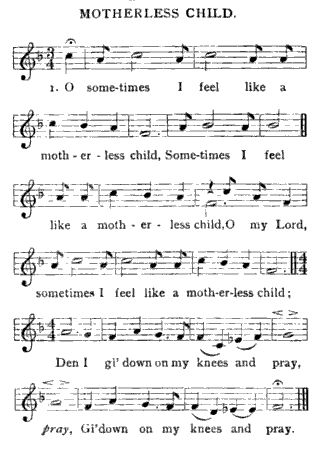Sometimes I Feel Like a Motherless Child

"Sometimes I Feel Like a Motherless Child" (or simply "Motherless Child") is a traditional Negro spiritual. It dates back to the era of slavery in the United States. An early performance of the song dates back to the 1870s by the Fisk Jubilee Singers.[1][2] Like many traditional songs, it has many variations and has been recorded widely.
Description
The song is clearly an expression of pain and despair as it conveys the hopelessness of a child who has been torn from her or his parents. Under one interpretation, the repetitive singing of the word "sometimes" offers a measure of hope, as it suggests that at least "sometimes" I do not feel like a motherless child.[3]
Although the plaintive words can be interpreted literally, they might alternatively be metaphoric. The "motherless child" could be a slave separated from and yearning for his or her African homeland, his or her spouse, parents, siblings, or child(ren) (from all or any of which he or she may have been separated in the trafficking process) or a slave suffering "a long ways from home"—home being heaven—or most likely all.[citation needed]
References
- ^ "Blue Gene" Tyranny, "Sometimes I Feel Like a Motherless Child" article, Allmusic
- ^ Barton, Hymns of the Slave and the Freedman, p.17 ("Not very long ago I attended a concert given by a troupe of jubilee singers, whose leader was a member of the original Fisk company. Toward the end of the programme he announced that a recently arrived singer in his troupe from Mississippi had brought a song that her grandparents sang in slave times, which he counted the saddest and most beautiful of song of slavery. It was a mutilated version of Aunt Dinah's song ['Motherless Child' or 'I feel like I'd never been borned.']")
- ^ *"Sweet Chariot: the story of the spirituals" Archived 2007-01-09 at the Wayback Machine by Arthur C. Jones
External links
- Recording by Odetta at dailymotion.com
- [1] recording by Esther & Abi Ofarim
- Lyrics as by J. W. Johnson & J. R. Johnson (1926) at negrospirituals.com
- Art of the States: Piano Sonata No. 4 musical work quoting the spiritual by African-American composer George Walker
- Works about American slavery
- Peter, Paul and Mary songs
- Hootie & the Blowfish songs
- Van Morrison songs
- Eric Burdon songs
- Tom Jones (singer) songs
- Portishead (band) songs
- Mildred Bailey songs
- Louis Armstrong songs
- The Osmonds songs
- American folk songs
- African-American spiritual songs
- Songs based on American history
